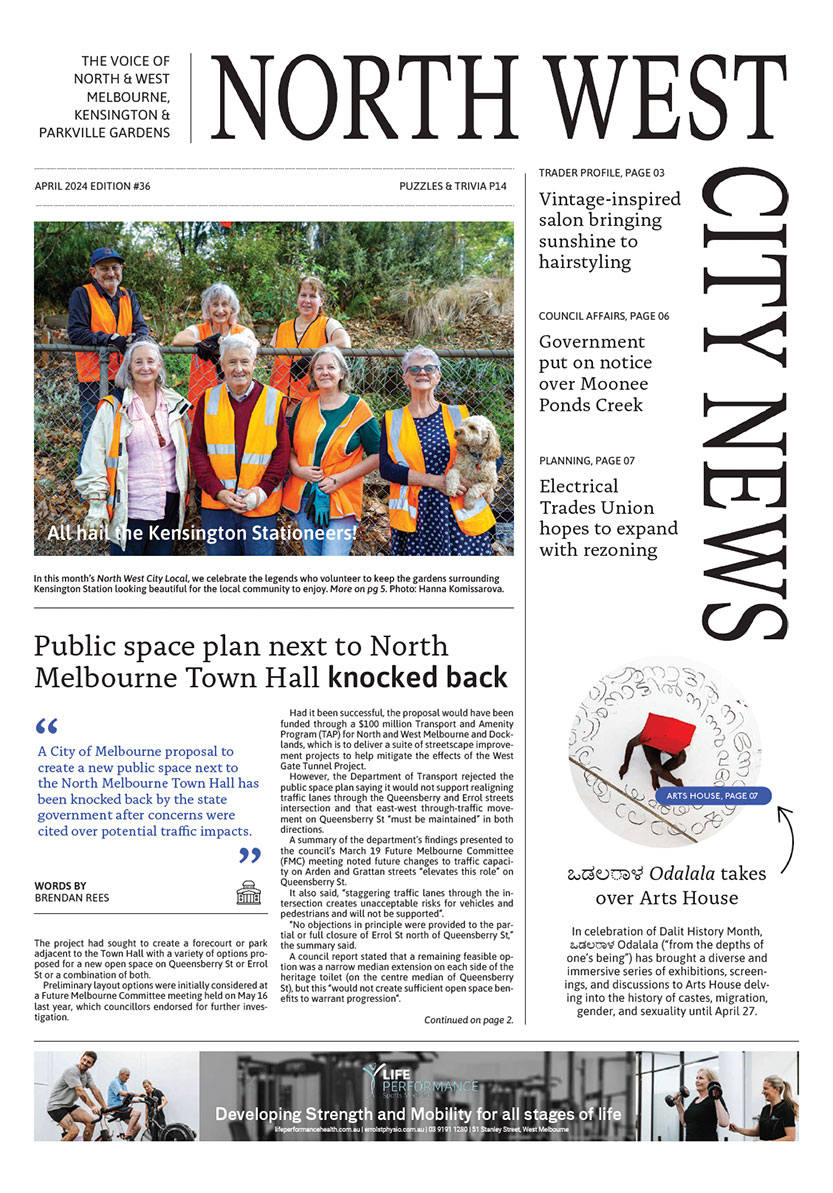Transition Town Kensington: Sustainability from the ground up
In the shadow of the public housing tower at 56 Derby St, Kensington, a hot, summer northerly was ruffling the leaves of the Kensington Community Food Forest, nestled next to a kids’ playground at the back of the building.
The garden, a point of pride and a source of fresh vegetables for locals in public and private housing alike, is lush and verdant despite the heat.
“It’s probably the first major project where public and private housing residents are working together … there’s a group that helps maintain the forest. And they’re from all walks of life,” Vincent Ryan, co-convenor of Transition Town Kensington, said.
Supporting grassroots initiatives such as the Kensington Community Food Forest is at the heart of what Transition Town Kensington does.
Established in 2017 and co-convened by Mr Ryan and permaculturalist Jacqueline Van Heerden, the not-for-profit organisation is a part of a growing international movement called “Transition”, founded in the UK in 2006.
The group’s aim is simple: to help the community transition to a more sustainable way of living by supporting local initiatives to reduce waste and reliance on fossil fuels, while also lobbying local government.
Ms Van Heerden said she approached Mr Ryan to form the group.
“I went to Vincent, and I said, ‘Do you want to start this with me?’ Because we’re both quite passionate about the environment,” she said.
After a couple of monthly meetings, the group’s direction began to take shape.
“What we started to do was, we started to educate and encourage, and jump on and support things that were happening, and activate things,” she said.
Their support for the Kensington Community Food Forest is one example of this.
Designed by Ms Van Heerden, the garden had been in the works for more than a year before Transition Town Kensington was formed.
Since the garden was established, it has been supported by the group.
Mr Ryan said that when the Food Forest started out, there was scepticism that the garden wouldn’t survive.
“If anything, it’s flourished, because people end up having such a strong connection to the land around them, rather than just a garden that’s maintained by someone else,” Mr Ryan said.
Deb Wilson, Community Engagement Manager at Unison which manages public housing in Kensington, said locals loved to walk through the garden, with neighbours keeping an eye on it, along with the volunteers who tended to the garden.
“They just respect it … if you build up something beautiful and usable, people take pride in it and they actually don’t want to destroy it. They want to see it flourish and grow,” she said.
During its three-year existence, the garden has become an important source of locally-grown, fresh food with a low carbon footprint.
This was particularly important during the pandemic last year, when there was a disruption of supply channels to SecondBite and Foodbank Australia.
Ms Van Heerden said the Kensington Community Food Forest, in conjunction with other local community gardens, harvested their surplus food for those who needed it.
“Four hundred kilograms of food came out of the gardens,” she said.
As well as the Food Forest, Transition Town Kensington has supported many other grassroots initiatives, including a street composting initiative which led to the establishment of the Kensington Town Hall Compost Hub.
The group has also run pop-up repair hubs at the Kensington Market, and are currently working on getting a permanent venue for a repair workshop.
They also lobby local government, in order to create an environment for change and to influence policy.
Mr Ryan said one thing Transition Town Kensington was strong on was the City of Melbourne’s 2019 declaration of a climate emergency.
“Transition Towns was at the forefront of lobbying councillors and helping lead a sense of general change, and the sense that there is an emergency,” he said.
Ms Van Heerden describes Transition Town Kensington as “the voice for the environment”, among the suburb’s many lobby groups.
Mr Ryan added that it was the grassroots, practical things that mattered, like composting, growing your own food and giving opportunities during crises like the pandemic for people to have access to locally-grown, fresh food.
“It’s about those practical, local initiatives that bring people together,” he said •

Jo Ryan unveils Ordered Chaos at Blender Studios





 Download the Latest Edition
Download the Latest Edition